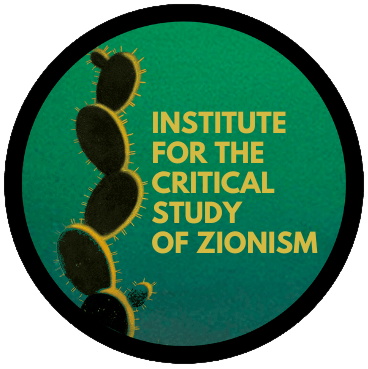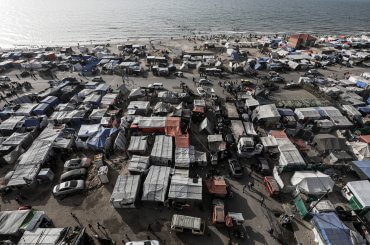In recent years, the Israeli flag has increasingly appeared around the world alongside racial supremacist political messaging– for instance, at the January 6th riot in Washington D.C., Hindutva rallies in India, Nazi rallies in Europe, and, most potently, in anti-Palestinian pogroms in the West Bank. At this point, it could not be clearer that Zionism is a political ideology tightly enmeshed with racism, fascism, and colonial dispossession. But the conditions for studying and resisting Zionism are incredibly difficult because Zionism has been framed by its proponents as “Jewish liberation,” while opposition to Zionism has been historically framed as antisemitic (or even, as the ADL habitually characterizes left-wing groups, framed in the rhetoric of totalitarianism). College students studying settler colonialism are deemed antisemitic. Antiracist organizers drawing links between U.S. repression and Israeli repression are labeled antisemitic. Ethnic studies teachers who include any content related to Palestine in classes are deemed antisemitic.
Despite the false antisemitic labels used to smear research and teaching on Zionism and Palestinian liberation, scholars and activists continue to produce crucial new knowledge in these areas. A growing body of exciting work is also looking at the work of Zionist politics and institutions in seemingly unexpected domains, from surveillance to education to farming, and critically analyzing how Zionist logics are reproduced and utilized in ideas and arguments about race, policing, land usage and climate change, and neoliberal capitalism. Extending well beyond the academy, this research is being undertaken by activists and organizers as well, in the United States, Palestine, and around the world who are directly confronting these systems of surveillance and repression.

Embracing this growing body of work, the Institute for the Critical Study of Zionism moves beyond the conventional conception of Zionism as a narrowly Jewish project and instead engages it as a combined political/ideological project with its own institutional infrastructure and set of repressive agendas. Of course, the Palestine liberation movement as a whole (which includes anti-Zionist Jewish scholars and activists) has long theorized and argued against efforts to conflate Zionist politics and ideology with Jews or Jewishness. The Institute arises from that long history of struggle. In academia in particular, extending the study of Zionism beyond its presumed exclusive location in Jewish studies is a necessary intervention that refocuses on Zionism as a political, ideological, racial, and gendered knowledge project whose structural consequences include, but are not limited to, the colonization of Palestine. By taking its place alongside Decolonial Studies, Settler Colonial Studies, Critical Ethnic Studies, Gender and Sexuality Studies, Critical Disability Studies, and related scholarship and activism, Critical Zionism Studies does not simply interpret the world but also works to change it.
Studying Zionism through such a comprehensive lens means, for instance, looking at the role of Zionist institutions in arenas beyond Palestine as well as the range of Jewish communities, organizations, and institutions where it is not as readily transparent. Critical Zionism Studies means examining how Zionist interventions move capital and shape the material conditions of life and death–in Palestine, North America, and beyond. Critical Zionism Studies means considering how Zionist politics form and influence common sensibilities about race, identity, and the possibility of shared liberation. Critical Zionism Studies means interrogating how sex/gender/sexuality are inflected, organized, directed, and contained in and through Zionist political and ideological projects. And this research is already happening, albeit on the rocky, uphill terrain of repressive conditions fostered and perpetuated by Zionist institutions. The Institute intends to counteract this repression by allocating space, resources, and visibility to Critical Zionism Studies, supporting and amplifying it through fellowships, conferences, and publications that will extend the reach of academic and activist knowledges into popular culture.
This task has never been more urgent, given the constant and intensifying attacks on critical Zionism research and activism, especially in North American and European universities. Departments of Jewish Studies and Israel Studies have all too frequently either spearheaded these attacks or served as the terrain wherein Zionist institutions try to assert control over knowledge about Zionism and police the permissible boundaries of critique. By contrast, the Institute for the Critical Study of Zionism is financially and politically transparent and grounded in grassroots spaces, offering an intellectual and political home for academics and activists across institutions and cultural sites. The Institute is a response to the pressing need to declare space, distribute resources, and galvanize the necessary dialogue, research, and pedagogical approaches that will constitute the knowledge bases of Critical Zionism Studies. As recent research has clearly shown, the rise of Israel studies in academia has been directly linked to Zionist donor-driven initiatives, as exemplified by the Tikvah Fund’s financing of lectureships, student fellowships, and events intended to “leverage” universities’ prestige and resources. This approach has been encouraged by the Israeli state as a strategic soft-power effort to enlist popular, political, and diplomatic support (in much the same way as the Israeli Ministry of Foreign Affairs has sought to build a base of LGBTQI+ supporters of Israel or undermine the call for BDS in the United States).
Students and faculty who insist on critically examining Israel and the foundational politics that undergird it, or who reject the notion that Zionism is simply a point of view rather than a mode and structure of state violence, have regularly been penalized and punished for, allegedly, “stifling academic freedom.” Yet it is anti-Zionist critics and scholars whose academic freedom has been violated. University administrations are often influenced by wealthy donors as well as the rhetoric produced within Israel Studies departments. By contrast, scholars studying the politics and impacts of Zionist institutions– especially those who center Palestine–are subjected to silencing, retaliation, and other repressive measures, adversely impacting their safety and livelihoods. These sanctions are meted out beyond the academy, by Zionist institutions, and, all too often, within it, by university administrators hamstrung by a combination of Zionist bullying and neoliberal imperatives of diversity, equity, and inclusion that conflate Jewish, Israeli, and Zionist “identities” as vulnerable subjectivities in need of protection. The Institute for the Critical Study of Zionism, working with scholars across fields, including but not limited to Jewish Studies, challenges the assumption that Jewish Studies—and, more obviously, the study of Zionism—must necessarily be pro-Zionist and overseen by Zionist faculty. A key part of the Institute’s work is to support resistance to the onslaught of campaigns seeking to equate the critique of Zionism with antisemitism. This tired tactic is increasingly the only means left to discredit the growing grassroots support for the Palestine solidarity movement, especially since claims like “Palestinians want to ‘throw the Jews into the sea’” have lost credibility and apologists for Israel’s escalating anti-Palestinian violence are increasingly unable to defend or justify them.
As academic workers, activists, and grassroots organizers who have already contributed to research on Zionism, both within the Palestinian context and beyond, we come together in committed support of this work (see the founding organizing collective here). The Institute is explicitly anti-Zionist, anti-racist, and anti-colonial, and is strictly committed to abiding by the BDS picket line, established by the 2005 call from Palestinian civil society. The Institute seeks to create an intellectual and political community grounded in solidarity with and dedicated to uplifting the voices, experiences, and lives of those most harmed by Zionism, understood as a broad set of colonial and repressive networks acting against dissenting peoples and movements. The points of unity below unite the Institute’s activist and academic members. Starting from this common ground allows for study, debate, and true academic freedom to pursue critical anti-Zionist research unhampered by constant derailing demands, bullying, smearing, and distractions. Perhaps most importantly, it allows the work to begin without having to declare or justify its first principles, which are a decisive rejection of the animating values of the neoliberal colonial university.
- Zionism is a settler colonial racial project. Like the United States, Israel is a settler colonial state. The Institute opposes Zionism and colonialism.
- Studying Zionism – its direct work for the Israeli state and its “other work” – is politically necessary. The rigorous, transnational study of Zionism as a political ideology and practice, and of Zionist institutions as political actors, is necessary for political pursuits from democracy to decolonization.
- Academic research is not politically or morally neutral. The Institute’s research aims to interrogate and intervene in racism, colonialism, ethnic cleansing, and the appropriation of liberatory rhetoric by repressive political forces, among other harms.
- We join in resistance to structures of racism, group supremacy, violence, militarism, colonialism, and capitalism. The Institute works in conjunction with interconnected movements, led from below, for justice and self-determination. Researching the role that Zionism plays in struggles over racism and violence advances those movements. Neither studying nor criticizing Zionism is anti-Jewish.
- Research on power must center the narratives and perspectives of those it dominates. The Institute’s project is to support research from below, produced by a community led by people who are the targets of Zionist and state repression, with a research agenda determined in collaboration with communities resisting repression.
- We reject the exclusionary/scarcity model of academic work. US academia is an exclusionary environment, and it is additionally exclusionary for those engaging critically with Zionism. We reject academic professional success as a measure of the value of our colleagues’ research, ideas, and participation. Instead, we aim to broaden the community of participation in rigorous research and conversation on Zionism, ensuring that it includes and uplifts students, junior and contingent faculty, activists, and communities whose lives are shaped by Zionist institutions’ political work.
- We protect each other by working accountably together. Researchers and activists are subjected to different levels of repression. We protect each other by adhering to shared security protocols and using less vulnerable voices to protect more vulnerable voices.
This October, an upcoming bicoastal conference, “Battling the ‘IHRA definition’: Theory & Activism,” will officially inaugurate the Institute. The conference will bring together scholars and activists for dialogue and organizing sessions and to share analysis and critiques of the International Holocaust Remembrance Alliance’s (IHRA) definition of antisemitism, which serves as both a tool of and a shield for repressive state power. We encourage activists and academics alike — all those who are battling the IHRA definition, including students, researchers, faculty, and organizers — to join the Institute’s mailing list to keep up with and support our work. If you’d like to be in touch or get involved in other ways, you can also email us at info@criticalzionismstudies.org.



I find it astonishing that an “Institute for the study of Zionism” appears to ignore the elephant-in-the-room which is that most Zionists are CHRISTIAN, especially if one adds in their close cousins the Evangelicals and those who are both Christian Zionist and Evangelical!
Seeing the reference to Jewish “identity” in scare quotes tells me all I need to know about this “Institute.”